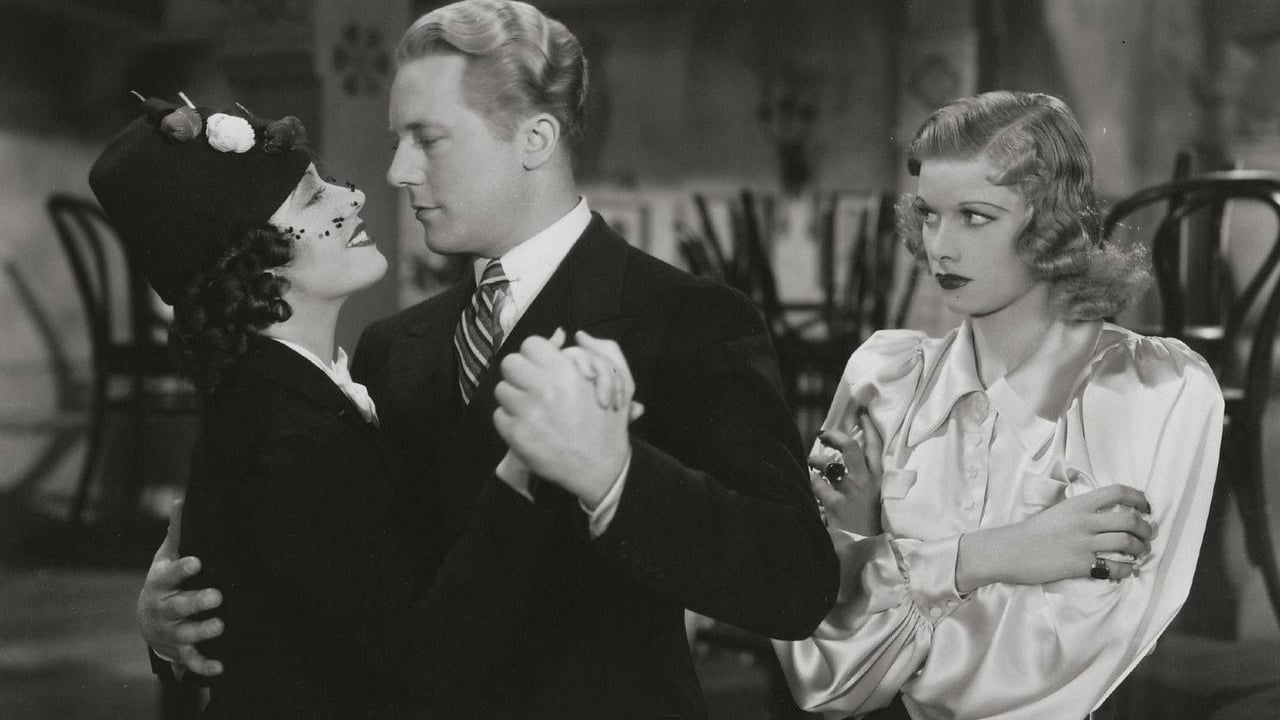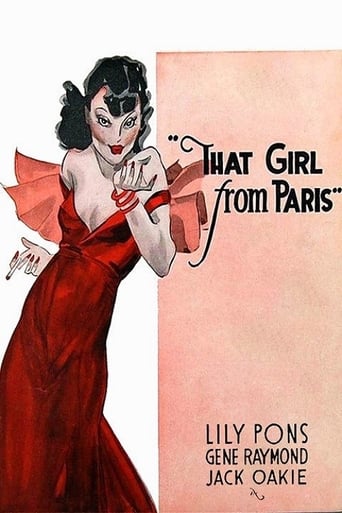

It’s fine. It's literally the definition of a fine movie. You’ve seen it before, you know every beat and outcome before the characters even do. Only question is how much escapism you’re looking for.
... View MoreThis is ultimately a movie about the very bad things that can happen when we don't address our unease, when we just try to brush it off, whether that's to fit in or to preserve our self-image.
... View MoreOne of the most extraordinary films you will see this year. Take that as you want.
... View MoreThe movie really just wants to entertain people.
... View MoreWhat works in this movie is the comedy of the four men - and, in her soapy dance number, of Lucile Ball. Both when they play swing and when they crack jokes, they're funny.What doesn't work, too often, is the star of the movie, Met coloratura soprano Lily Pons. I enjoy Pons' operatic recordings, and have most of them, but she doesn't work well in this movie. She had neither the personality nor - to be honest - the looks of Jeannette MacDonald or Grace Moore, and at this point she was still having real problems with the English language. A comedy with a lead who isn't good with the language is a real problem. Contrast her with Herman Bing, who misused English to comic effect, and you see the difference. She was no dancer, at least in this movie, either. Her one real talent, that for which she was famous at the Met, was her high notes.That causes problems in a movie made for a general audience. She is too often given music to show off her very high notes and her staccati. At the Met audiences appreciate that sort of thing, but it seems misplaced in what was meant to be a general audience movie. She should have been given more lyrical music, less fireworks. Think of Jeannette MacDonald singing "San Francisco" in the movie of the same name, which came out the year before, or Grace Moore singing "Ciriciribin" - much less "Minnie the Moocher".It's interesting to see how she performs "Una voce poco fa" in her Met Opera scene. If that's how she did the role on state, she was not much of an actress even by the operatic standards of her day.This movie could also have used a better director, to make the comedy scenes even better, or perhaps to have helped Pons do a better job.But the basic problem is that Pons was not movie material, at least not for this sort of general audience comedy. She doesn't sink the picture, but she doesn't add anything positive to it, either.Footnote: The year after making this picture, the male lead, Gene Raymond, would marry Jeannette MacDonald, another lyric coloratura who was much better suited to the movies, and much better presented there.
... View MorePerhaps it made sense from a commercial standpoint: bringing a great lady of the opera, Lili Pons, to a level at which the public could more easily relate to her - perhaps even to identify with her in some respects. The result, ideally, would have been to create a leading lady in films who sang divinely as she was surrounded by "us." Miss Pons gave it her best try - here and elsewhere - but it just didn't work. Most unfortunately, the filmmakers effort to generate the common touch involved presenting her in the most commonplace outfits, makeup and coiffure, downplaying the "glamour" associated with grand opera. Supporting her with the buffoonery of Jack Oakie and his cohorts, having her hiding under blankets, climbing here and there, etc. doesn't register either. Though no beauty, Lili Pons can radiate elegance and charm (along with her great vocalizing), as she does, in full costume, when she sings "Una voce poco fa" in this picture. Her movies don't give us enough of the Lili Pons that made her a stage presence, and might have made her a screen presence. To have her play against (her own) type - here and elsewhere - was a mistake.
... View MoreThis is really a wonderful surprise, a charmingly contrived, irresistibly tune-filled operetta, made for RKO in 1936, directed by Leigh Jason. It was intended as a vehicle for its star, Lily Pons, playing the role of a Parisian opera star Nikki Martin that flees her wedding and becomes a stowaway hiding in a ship compartment occupied by an American Jazz band. Nikki meets and falls in love with the band leader Windy McLean (Gene Raymond) and she travels with his band from France to America.Ms. Pons was a superior opera star of its time and "That Girl From Paris" is all hers, though other players, Jackie Oakie, Gene Raymond, Lucille Ball, Mischa Auer, Hermann Bing are all exceptionally good as well. Tall, willowy, coolly complacent (some would say stand-offish), Ms. Pons was no beauty like Jeanette MacDonald or Grace Moore, but she is endowed with an overpoweringly deep, searing opera voice that would put both Jeanette & Grace to shame. As much as the studio is promoting its opera star, RKO is also including as much classical & jazz music as possible and for this, it succeeds.Much of the movie's charm & vivacity seems to run out of gas in the last fifteen minutes or so as the filmmakers try to endow the contrived scenario with a happy, forced ending, but everything before it was a sheer delight.
... View MoreIt does have one scene of note. Pons plays an opera singer hiding out with a jazz band. The band knows nothing of her identity. She sabotages their singer (Lucille Ball in an early role) and is forced to go on stage as a substitute. Well, she only knows opera; the band only knows jazz. She sings "The Blue Danube" with both her and the band segueing from classical singing to jazz and back. It's a really delightful number, very inventive. If the movie is ever on TCM or AMC, it's work a look just for that
... View More